
US President Donald Trump’s comments regarding trade are drawing anxious concern from all directions. Certainly, upon checking President Trump’s various comments from an economics-based standpoint there are many mistakes to be found; and the possibility of those mistakes having a real and significant negative impact on global trade is now increasing. The Two Types of Mistakes in Trump’s Views on Trade As far as I can see, we can divide the mistakes in the newly inaugurated President Trump’s views on trade into two main types. The first type of mistake is the clear and obvious type, which everyone can point out. A textbook example would be his assertions about protective trade. Trump insists that the influx of imported goods from overseas is robbing Americans of employment opportunities domestically. This naturally leads us to a policy of restricting imports in order to protect domestic employment; ... ... [Read more]

